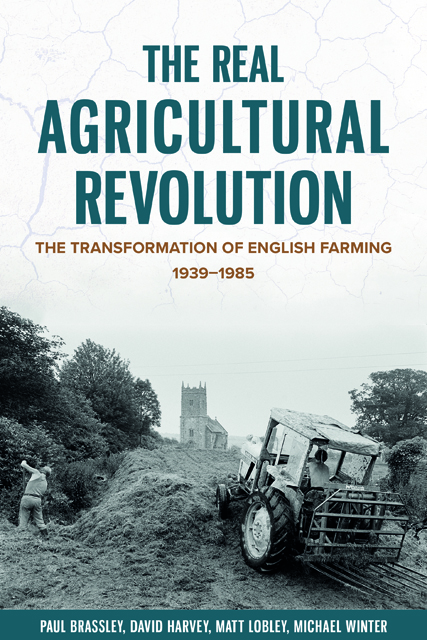Book contents
- Frontmatter
- Contents
- Figures and Tables
- Preface and Acknowledgements
- Abbreviations
- 1 Introduction: Exploring Agricultural Change
- 2 The Organisation of Agricultural Science, 1935–85
- 3 Knowledge Networks in UK Farming, 1935–85
- 4 Agricultural Policy, 1939–85
- 5 Dairy Farming
- 6 Land and Capital
- 7 Labour and Machinery
- 8 Specialisation and Expansion
- 9 The Declining Enterprises: Pigs and Poultry
- 10 Conclusions
- Bibliography
- Index
4 - Agricultural Policy, 1939–85
Published online by Cambridge University Press: 04 January 2024
- Frontmatter
- Contents
- Figures and Tables
- Preface and Acknowledgements
- Abbreviations
- 1 Introduction: Exploring Agricultural Change
- 2 The Organisation of Agricultural Science, 1935–85
- 3 Knowledge Networks in UK Farming, 1935–85
- 4 Agricultural Policy, 1939–85
- 5 Dairy Farming
- 6 Land and Capital
- 7 Labour and Machinery
- 8 Specialisation and Expansion
- 9 The Declining Enterprises: Pigs and Poultry
- 10 Conclusions
- Bibliography
- Index
Summary
The business environment within which farmers made decisions about whether or not to adopt new technologies was at least influenced, if not determined, by government agricultural policy, so any account of technical change should pay attention to policy developments. Income and price support measures, grants, and subsidies, as well as the provision of advice and ministerial encouragement, could all encourage farmers to invest and produce more; and at the end of this period the imposition of quotas and changes in support regimes provided signals to restrict production. These agricultural policies were formulated within historical, political, and economic contexts, which should therefore at least be outlined in charting their evolution. Consequently, this chapter examines the major changes in agricultural policy and attempts to put them in context. It distinguishes between policies aimed at influencing the payments received by farmers for their products, and other policies, but does not attempt, for reasons that will become obvious, to produce a detailed and comprehensive account of agricultural policy changes between 1939 and 1985.
The Pre-War Policy Context
Government policies affecting agriculture can be traced back as least as far as regulations affecting the wool trade in the medieval period. From the later seventeenth century, export bounties and import duties regulated international trade in cereals, and by 1750 there were numerous measures to encourage the cultivation of alternative crops such as hemp, flax, and madder, to promote land drainage, regulate enclosure, tithes, and markets, control animal disease, especially cattle plague, and prevent the import of Irish cattle. In 1846, the regulations on cereal imports and exports – the Corn Laws – were repealed, and at the same time a wide range of duties on other food imports, such as dairy products, fruit, vegetables, and sugar, were also discontinued. At first sight, therefore, apart from a few years during and after the First World War, there was no agricultural policy between 1846 and the early 1930s. This is a misconception. Although there may have been no direct intervention in market prices, there were measures to protect animal health that led to intervention in agricultural trade from the 1870s onwards, to protect farmers from adulteration of fertilisers and feedingstuffs, and to promote smallholdings and rural industries as a means of retaining labour on the land.
- Type
- Chapter
- Information
- The Real Agricultural RevolutionThe Transformation of English Farming, 1939-1985, pp. 88 - 110Publisher: Boydell & BrewerPrint publication year: 2021



